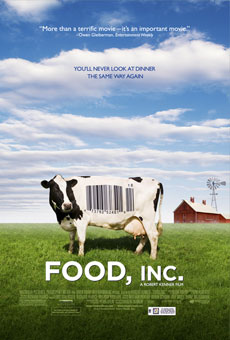 A new movie, Food, Inc., will be in theaters starting June 12. The film documents how industrialized agriculture has changed the food we eat and explores the impact of this change on health, food safety, and the environment. In the movie’s trailer (see below), a woman eyeing vegetables in a grocery store says “Sometimes you look at a vegetable and say, well, we can get two hamburgers for the same price.” That about sums up the problem with the American diet, a problem directly related to a decrease in health (diabetes, heart disease) and an increase in weight (the so-called “obesity epidemic”).
A new movie, Food, Inc., will be in theaters starting June 12. The film documents how industrialized agriculture has changed the food we eat and explores the impact of this change on health, food safety, and the environment. In the movie’s trailer (see below), a woman eyeing vegetables in a grocery store says “Sometimes you look at a vegetable and say, well, we can get two hamburgers for the same price.” That about sums up the problem with the American diet, a problem directly related to a decrease in health (diabetes, heart disease) and an increase in weight (the so-called “obesity epidemic”).
Here’s the official description of the film:
In Food, Inc., filmmaker Robert Kenner lifts the veil on our nation’s food industry, exposing the highly mechanized underbelly that has been hidden from the American consumer with the consent of our government’s regulatory agencies, USDA and FDA. Our nation’s food supply is now controlled by a handful of corporations that often put profit ahead of consumer health, the livelihood of the American farmer, the safety of workers and our own environment. We have bigger-breasted chickens, the perfect pork chop, insecticide-resistant soybean seeds, even tomatoes that won’t go bad, but we also have new strains of E. coli–the harmful bacteria that causes illness for an estimated 73,000 Americans annually. We are riddled with widespread obesity, particularly among children, and an epidemic level of diabetes among adults. … Food, Inc. reveals surprising–and often shocking truths–about what we eat, how it’s produced, who we have become as a nation and where we are going from here.
Kenner, the producer/director, and Eric Schlosser, author of Fast Food Nation, started talking about a documentary of Fast Food six or seven years ago. By the time the film was funded, both Kenner and Schlosser were heavily influenced by the ideas of Michael Pollan, author of The Omnivore’s Dilemma
and In Defense of Food
.
One objective of the film is to make people think twice about what they eat. Here are some comments from an advance review in the LA Times:
After seeing a typical Perdue chicken house, you’d never buy a basket of fried chicken again. If you saw the inside of the world’s largest hog slaughterhouse in Tar Heel, N.C. (where a lot of the hidden camera footage was shot by actual workers there), you’d never order any more bacon with your eggs. And if you saw America’s biggest cattle yards, where cows stand ankle deep in their own manure, you’d take a pass on that nice juicy steak they serve at your favorite restaurant.
The big corporations of industrial agriculture — Monsanto, Tyson, Perdue, Smithfield — declined to be interviewed for the film. That’s hardly surprising. If you were responsible for the corporate interests of the food industry, would you trust your comments to the editors of a film featuring the authors of Fast Food Nation and The Decline of Food? I don’t think so.
Corporate greed and the public interest
Focusing on how big corporations profit at the expense of the public good is a laudable endeavor. It can incite people to condemn selfish greed and unethical behavior. A red flag goes up for me, however, when I read things like “exposing the highly mechanized underbelly that’s been hidden from the American consumer with the consent of our government’s regulatory agencies.” It sounds a little too much like a wacko conspiracy theory.
The issue of corporate greed vs. public health is always a bit more complicated than even a ninety-minute sound bite can explain. My hope for Food, Inc. is that it doesn’t minimize or misrepresent the complexities of the important issues it raises. The advance reviews and the information on the extensive website are highly promising.
Related posts:
Links of interest: Organic food
Pig dignity: Animal welfare in Europe
Is it safe to eat yet?
Is agriculture bad for your health?
Not just peanut butter: What’s happening to our food supply?
Do houseflies spread antibiotic resistance?
Sources:
(Hover over book titles for more info.)
Food, Inc. the website
Karl Weber, editor, Food Inc.: A Participant Guide: How Industrial Food is Making Us Sicker, Fatter, and Poorer-And What You Can Do About It
Eric Schlosser, Fast Food Nation
Richard Linklater, director, Fast Food Nation
Michael Pollan, The Omnivore’s Dilemma: A Natural History of Four Meals
Michael Pollan, In Defense of Food: An Eater’s Manifesto
Patrick Goldstein, The Big Picture goes on a hunger strike, Los Angeles Times, September 9, 2008


Sorry, comments are closed for this post.